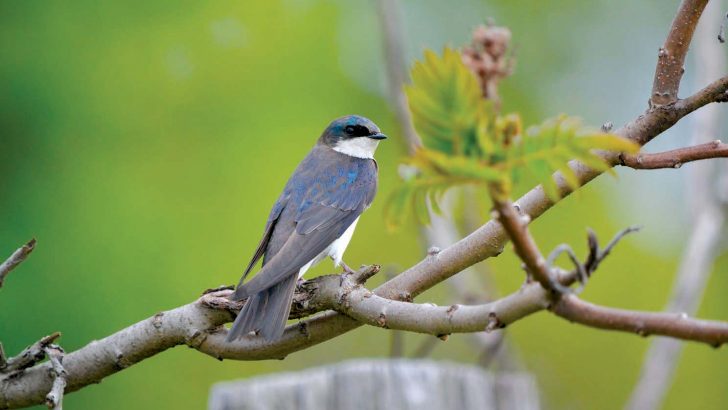The newly arrived swallows swoop across the evening sky; happy heralds of summer. They have journeyed from Africa to our eaves, where they will nest for the summer.
Our little valley has become rewilded in recent years, with acres of new woods springing up nearby us. Buzzards and falcons now regularly soar overhead. Trout frequent our stream in greater numbers, while rabbits scamper in the grass. There is even a wild deer which sometimes visits at dusk. As we quietly approach, it stares at us for one curious moment and then leaps silently into the woods – disappearing into the tangled green, like some creature of myth returning to its otherworldly realm.
Now that we are bound to our immediate surrounds by the coronavirus pandemic, the children are witnessing the drama of nature’s great springtime awakening first-hand. They are excited to find a blue blackbird’s egg shell in the grass, cracked open. They ask, did the chick safely hatch, or did a magpie take it? They creep softly towards the stream at dusk, to see what creatures they might see swimming there. They issue a barrage of questions: How do those insects walk on the water? How do birds stick their nests together? What is a hawk’s chick called?
They often go out into the gloaming to see the bats scampering in circuits through the air, hunting flies and moths. From first light, the dawn chorus now fills the valley, and all the chirpy chatter even enters into our bedrooms and intrudes upon our dreams.
Yet nature is not all music and flowers. My eldest daughter ran to me the other day in floods of tears, having found a badly injured rabbit, which she begged me to help. It had been attacked by a predator, and was left injured and twitching, unable to escape. Its terrified brown eyes looked up at us as the life left its body. I told her I’d bury it and asked if she wanted to put a flower on its grave, she sobbed and said, “no, that would make it even worse”. Later that same week, the children saw a fox leap down upon another rabbit, kill it and then saunter nonchalantly back towards its den with the corpse hanging from its mouth. Nature is also cold and indifferent, and its cycles of life and death are the engine of its flourishing.
I don’t think that the peace we find in nature is a product of nature per se. I see nature as more like a signpost. Our immersion in it sets our souls right, so that we become susceptible to glimpsing something eternal, something which permeates all nature. I sometimes catch one of the children sitting alone, lazing in the woods, gazing at the sparkling stream in a reverie, happily lost in a soundscape of water, breeze and birdsong. As they stare contently, I can see that their mind has shifted gear, and that a deep peace has come upon them. That peace stays palpably with them long afterward too. Something in them has been unlocked.


 Rory Fitzgerald
Rory Fitzgerald
